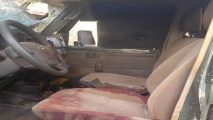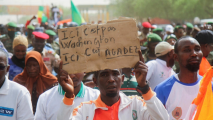Categories
Recent Posts
- Cameroon is broken: Who can fix it?
- Cameroonian beer and soft drinks exports soar by 73% and 46.6% in 2022
- Southern Cameroons Crisis: 2 teachers abducted in the North West
- World Bank says despite high potential, 75 vulnerable economies face ‘Historic Reversal’
- Cardinal Robert Sarah says Western prelates have lost their nerve
Archives
- April 2024
- March 2024
- February 2024
- January 2024
- December 2023
- November 2023
- October 2023
- September 2023
- August 2023
- July 2023
- June 2023
- May 2023
- April 2023
- March 2023
- February 2023
- January 2023
- December 2022
- November 2022
- October 2022
- September 2022
- August 2022
- July 2022
- June 2022
- May 2022
- April 2022
- March 2022
- February 2022
- January 2022
- December 2021
- November 2021
- October 2021
- September 2021
- August 2021
- July 2021
- June 2021
- May 2021
- April 2021
- March 2021
- February 2021
- January 2021
- December 2020
- November 2020
- October 2020
- September 2020
- August 2020
- July 2020
- June 2020
- May 2020
- April 2020
- March 2020
- February 2020
- January 2020
- December 2019
- November 2019
- October 2019
- September 2019
- August 2019
- July 2019
- June 2019
- May 2019
- April 2019
- March 2019
- February 2019
- January 2019
- December 2018
- November 2018
- October 2018
- September 2018
- August 2018
- July 2018
- June 2018
- May 2018
- April 2018
- March 2018
- February 2018
- January 2018
- December 2017
- November 2017
- October 2017
- September 2017
- August 2017
- July 2017
- June 2017
- May 2017
- April 2017
- March 2017
- February 2017
- January 2017
- December 2016
- November 2016
- October 2016
- September 2016
- August 2016
- July 2016
- June 2016
Featured
Most Commented Posts
 4 Anglophone detainees killed in Yaounde
4 Anglophone detainees killed in Yaounde
19 comments Chantal Biya says she will return to Cameroon if General Ivo Yenwo, Martin Belinga Eboutou and Ferdinand Ngoh Ngoh are sacked
Chantal Biya says she will return to Cameroon if General Ivo Yenwo, Martin Belinga Eboutou and Ferdinand Ngoh Ngoh are sacked
13 comments Anglophone Nationalism: Barrister Eyambe says “hidden plans are at work”
Anglophone Nationalism: Barrister Eyambe says “hidden plans are at work”
12 comments The Anglophone Problem – When Facts don’t Lie
The Anglophone Problem – When Facts don’t Lie
12 comments Largest wave of arrest by BIR in Bamenda
Largest wave of arrest by BIR in Bamenda
10 comments
Latest Tweets
Featured
-

Cameroon is broken: Who can fix it?
-

Cameroonian beer and soft drinks exports soar by 73% and 46.6% in 2022
-

Southern Cameroons Crisis: 2 teachers abducted in the North West
-

World Bank says despite high potential, 75 vulnerable economies face ‘Historic Reversal’
-

Cardinal Robert Sarah says Western prelates have lost their nerve
-

Iran launches drones at Israel in retaliatory attack
-

Thousands protest in Niger demanding immediate withdrawal of US troops
© Cameroon Concord News 2024





17, February 2020
Southern Cameroons Crisis: Human Rights Watch shares the blame 0
Human Rights Watch (HRW), the global human rights watchdog, has released a report on the ongoing carnage playing out in Cameroon’s two English-speaking regions.
The report holds the country’s security forces responsible for some of the most atrocious human rights crimes taking place in the country’s two English-speaking regions.
Cameroon’s security forces are supposed to protect civilians, but they seem to be departing from their traditional role of protecting and serving the people. Their guns have become toys with which they play. Intimidation has become their hallmark and killing fellow citizens no longer generates guilt.
But the report also points a finger at armed separatist fighters who claim they are fighting for the total liberation of their territory, but have, over the last two years, been engaged in behavior that needs to be punished.
A conflict that started as protests by teachers and lawyers was poorly managed by the government due to arrogance and intransigence. Three years after, killing and kidnapping have become great sports in the Northwest and Southwest regions, with security forces playing an active role in these new activities.
Below are some of the tales of agony that HRW obtained from victims of the violence that seems to have received the government’s seal of approval.
Violations by Security Forces
Twelve Bali residents told Human Rights Watch that soldiers, including members of the Rapid Intervention Battalion (BIR), and gendarmes began a three-day security operation in their village on January 17. Armed separatists had operated in the area since 2017. Witnesses said that security forces beat and killed at least four civilians, including two men with intellectual disabilities, Julius Ntali, 55, and Mumbat Charlie, 25, who appeared to have been shot, and his body burned as the house was set on fire.
A witness to Ntali’s killing said:
On January 18, there was a gathering in a house in Sang neighborhood for a funeral. I passed by and saw that Julius was there, eating. It was about 3 p.m. when the security forces stormed the area. They shot indiscriminately, and everyone ran away for their lives. Julius didn’t understand what was happening around him and was hit. We only found his body two days later when the area became quieter, since the military had left. His body was in a state of decomposition, but I saw a sign of a bullet in the head.
A witness to Charlie’s killing said:
On January 19, at least 10 BIR soldiers came to Mom neighborhood in Bali, where I live. They shot in the air around and burned the home where Charlie was living. I was in my house. I watched everything from my home, about 30 meters away. When the shooting finished and the burning was over, I went out and found Charlie’s body. He had been shot in the neck and in the head. His body was totally burned.
Several witnesses told Human Rights Watch that the security forces killed at least two other men in Tih neighborhood between January 17 and 20. However, Human Rights Watch was not able to independently verify this information.
Security forces beat at least four women, including a nursing mother with her baby and a 70-year-old woman with a physical disability, in a home in Sang neighborhood, Bali, where they were hiding at about 1:30 p.m. on January 19, during the military operations. One of the victims, a 34-year-old nurse, said:
The soldiers used wooden sticks to beat me and the other women. They asked us where the Amba boys [separatists] were. We said we didn’t know, and they kept hitting us. The beating lasted up to 30 minutes. A soldier slapped a nursing mother in the face. She had a 4-month-old baby with her.”
Soldiers, including members of the BIR, and gendarmes also beat a 46-year-old man in an abandoned school, the Bali Comprehensive High School, in Sang neighborhood on January 19, seriously injuring his face. He said:
I was in front of the Bali Presbyterian Church when a gendarme called me. He was with 30 other gendarmes and soldiers. He confiscated my phone and asked where the separatists were hiding. I said I didn’t know. He acted as if he didn’t believe me. So, the military pulled me and took me on foot to an abandoned school, one kilometer away. While we were walking, the military slapped and kicked me. At the school, they accused me of being an accomplice to the separatists, hit and punched me for about 25 minutes. They hit my nose badly and I bled profusely. I cried until they brought me back to the main road and left me there.
Security forces also burned and looted up to 50 homes in Bali. Witnesses said they believed that the military retaliated against civilians suspected of harboring separatists or supporting the SDF. Human Rights Watch reviewed satellite imagery taken before and after the attack and confirmed the destruction of buildings consistent with witness testimony.
Human Rights Watch also reviewed video footage featuring homes and businesses that were destroyed in Bali. This footage was both gathered from social media platforms and sent directly to Human Rights Watch. Verifying and geolocating these videos corroborated sites of damaged buildings that were consistent with the satellite imagery of those locations and with witness testimony.
A woman who fled to the forest when the security forces approached her neighborhood, Sang, described what she saw from her hiding place:
The military came on January 19 at about 1 p.m. They arrived on foot and started shooting everywhere. I ran away with my four children and hid nearby. I saw how the soldiers burned my home and my workshop; they destroyed everything.
The Bali residents interviewed said that the separatists who had been in town fled well before the soldiers arrived and there was no confrontation between the security forces and the separatists.
A 55-year-old resident of Bali whose home was burned down by the soldiers on January 17 said:
Dozens of Cameroonian soldiers came to Bali with armored cars and trucks. They targeted the homes of SDF leaders and civilians’ homes where they suspected the Amba boys [separatists] were hiding. The military came to punish and scare the population. As the military approached my neighborhood, Paila, I ran away and hid. My home was razed. I counted 28 soldiers burning it and transporting bags of items looted from it, including a TV and food.
The security forces also searched the Bali district hospital on January 19, causing some patients to flee out of fear. A medical staff at the hospital told Human Rights Watch:
I was on duty when six armed gendarmes entered our facility at about 1 p.m. They asked me where we hid and treated the Amba boys [separatists]. I responded that we only had patients. They wanted me to show them all wards. They entered all the units, including the maternity. I was scared of their weapons, and so were the patients, and some panicked and ran away out of fear.
Abuses by Armed Separatists
Kidnapping
On February 2, armed separatists kidnapped Joseph Tarh Pen, a CPDM member running for mayor in Santa, North-West region. In the days after he was kidnapped, a video circulated on social media showing Tarh, stripped naked and in the dirt, while accused of being a traitor. Human Rights Watch spoke with one relative and two friends of Tarh who identified him in the video. They said that the video was filmed after Tarh’s kidnapping in Piyin village, near Santa. Tarh’s relative said that two of Tarh’s brothers – who were contacted by the separatists to arrange a ransom payment – were also kidnapped, on February 3. The two brothers were released on February 8, while Tarh is still held by the separatists at time of writing.
Armed separatists from the group Restoration Forces led by a commander known as “General Man Pass Man” kidnapped the SDF mayor of Babessi, North-West region, along with four council members from the party on January 5, 2020 in Babessi. The Restoration Forces released them on January 22, following a ransom payment of 1,000,000 CFA (US$1,678). Human Rights Watch spoke with three of those abducted. One, a 49-year-old man, said: “They told us that they kidnapped us to prevent us from participating in the elections. When they let us go, they said we will be monitored all the days of our lives.”
The separatists had also kidnapped and tortured the Babessi mayor in June 2019.
In November 2019, the Restoration Forces kidnapped 20 SDF candidates in the town of Jakiri, North-West region. The officials were held in a small house near a separatist camp in Vekovi village. They were released on December 8, after ransom payments believed to be between CFAF 250,000 and CFAF 500,000 ($419-$838) were paid for each abductee.
“It was about 7 p.m. when two Amba boys [separatists] broke into my shop,” a victim from Jakiri said. “They pointed a gun at my forehead and told me to go with them. They told me I was being kidnapped because my name was on the list of those running for local elections.”
Burning of Property
Armed separatists burned down the home of Acha Kennedy, a candidate for the ruling CPDM, in Bamenda, North-West region, on January 12, 2020, and the home of the mayor in Bafut, North-West region, on January 15, witnesses said. A neighbor of Kennedy said:
At around 9:30 p.m. I opened the door and saw five motorbikes going down to the residence of Mr. Acha. I watched closely. They were Amba boys [separatists]. They had their guns and held tires of vehicles in their hands. They set them on fire and threw them on the roof of Acha’s home. That was how the house was set ablaze. We live in fear.
Witnesses said that a group of about 15 armed separatists – from a group known as “Nsei boys” operating in Mbesoh neighborhood, in Bamessing – burned down four homes belonging to two officials in Bamessing, North-West region, on November 20, 2019. One of the homes was used as a private health center.
A witness, the brother of one of the officials, said:
I used my brother’s home as a health center. I was there with a dozen of people waiting for consultations when the separatists came. They had guns, machetes, and knives. Some appeared to be high on drugs. They demanded we leave. Then, they set the home on fire. The roof was burned, as well as all my medical equipment.
Another of the official’s homes was burned on January 23. He said that he had also been threatened for sending his children to school.
A sister of the other official said that the separatists beat her when they burned her sister’s home. “They had tanks of 20 liters each full of petrol and kerosene, which they started pouring around,” she said. “Then, they set the house on fire. I broke into tears, and so two of them started hitting my back, buttocks, and feet using machetes and sticks.”
Obtained from the HRW report.